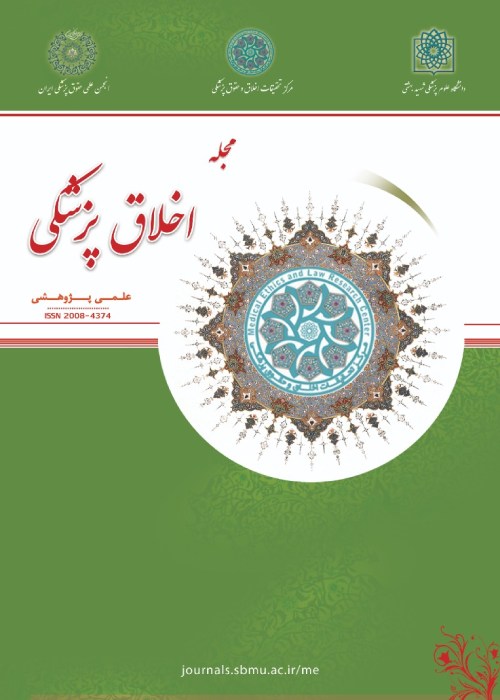Correlation between the Ethical Climate, Job Stress and Job Satisfaction in Nurses
Author(s):
Abstract:
Background And Aim
Nursing is a profession mixed with stress and psychological stress and numerous ethical issues. The attitudes and perceptions of nurses and their perception of the governing climate affect their performance and their job satisfaction or stress in organizational affairs. Climate is a phenomenon that always exists in the organization and dominates the attitude of the people as the hidden force. The climate is the perception channel through which the effects of the environment on the views and behaviors are determined. Ethical climate is important for organizations and affects employee's ethical behavior. The discovery of the relationship between ethical climate and employee's attitudes and behavior is considered as one of the most important issues in organizational studies. Therefore, the present study aimed to determine the correlation between ethical climate, job stress and job satisfaction among nurses working in Imam Khomeini Hospital, Urmia in 2015.Materials And Methods
The study population of this cross-sectional correlational study included nurses working in Imam Khomeini Hospital affiliated to Urmia University of Medical Sciences. Of the 366 nurses, 200 were selected using quota sampling method. Data collection was carried out using Victor and Cullen's Standard Ethical Climate (1999), Sutherland Job Stress (1995) and Brayfield & Rothe Job Satisfaction Questionnaires (1991). Cronbach's alpha of Ethical Climate, Job Stress and Job Satisfaction Questionnaires were calculated 0.72, 0.82, and 0.74, respectively. Also, in order to investigate the validity of the questionnaires, despite the standardization of the tools and their repeated use in domestic and foreign research, factor analysis was performed on the data obtained from the implementation of this scale were in the sample group. This analysis has been carried out in the form of exploratory analysis using the main component (PC) with Varimax rotation. The KMO coefficient was equal to 0.73 and the Xi value of Bartlett Sprite test 14506.8 was obtained, which was significant at 0.01, indicating the adequacy of the sample size and the sample variables for performing factor analysis. The results were confirmed and aggregate variance of 0.78 was obtained. For data analysis, descriptive statistics, Pearson correlation and regression tests were used in SPSS ver. 18 software. This research is the outcome of the M.A thesis of Urmia University, number A4/863.Ethical considerations: After obtaining the necessary permissions and familiarizing the participants with the objectives of the research, participant's oral satisfaction was obtained. Participants were assured about the confidentiality of information and the publication of the results of the study as a group.
Findings: Participant's demographic information was as follow: female population (58%), age group of 26 to 30 years old (32.5%), Nurses with bachelor's degree (79%) and job experience of 6 to 10 years (49%). The mean and standard deviation of ethical climate, job satisfaction and job stress scores of participants were 80.55 ± 3.47, 28.44 ± 4.86 and 97.61 ± 17.21, respectively. Significant correlation was observed between the variables of ethical climate with job satisfaction (r = 0.395) and job stress with job satisfaction (r = -0.243) (P 0.01). Regression analysis showed that ethical climate predicts 34% of nurse's job stress (P
Conclusion
The results of this study showed that there is a significant relationship between ethical climate, job stress and job satisfaction of nurses; in fact, as the hospital climate becomes more ethical, the job stress of nurses is less and their job satisfaction is higher. The limitations of this study include the lack of control of economic, social, and cultural variables. Considering the limited statistical population of this study, generalization of the results to nurses working in other hospitals and employees of other organizations should be carried out with caution. Our suggestions for future studies include investigation of the relationship between ethical climate and ethical stress with individual and organizational performance and their interaction on linking job satisfaction with organizational results and outcomes in similar professional environments and other health professionals. Considering the correlation observed between ethical climate, job stress and job satisfaction, it is suggested that hospitals managers and authorities provide the necessary ground for institutionalization of professional ethics and decrease nurse's job stress and enhance their job satisfaction and quality of care for patients by creating an appropriate ethical climate. Also, holding training nurses on how to deal with ethical issues is recommended.Keywords:
Language:
Persian
Published:
Journal of Medical Ethics, Volume:11 Issue: 40, 2017
Pages:
63 to 71
magiran.com/p1724809
دانلود و مطالعه متن این مقاله با یکی از روشهای زیر امکان پذیر است:
اشتراک شخصی
با عضویت و پرداخت آنلاین حق اشتراک یکساله به مبلغ 1,390,000ريال میتوانید 70 عنوان مطلب دانلود کنید!
اشتراک سازمانی
به کتابخانه دانشگاه یا محل کار خود پیشنهاد کنید تا اشتراک سازمانی این پایگاه را برای دسترسی نامحدود همه کاربران به متن مطالب تهیه نمایند!
توجه!
- حق عضویت دریافتی صرف حمایت از نشریات عضو و نگهداری، تکمیل و توسعه مگیران میشود.
- پرداخت حق اشتراک و دانلود مقالات اجازه بازنشر آن در سایر رسانههای چاپی و دیجیتال را به کاربر نمیدهد.
In order to view content subscription is required
Personal subscription
Subscribe magiran.com for 70 € euros via PayPal and download 70 articles during a year.
Organization subscription
Please contact us to subscribe your university or library for unlimited access!


